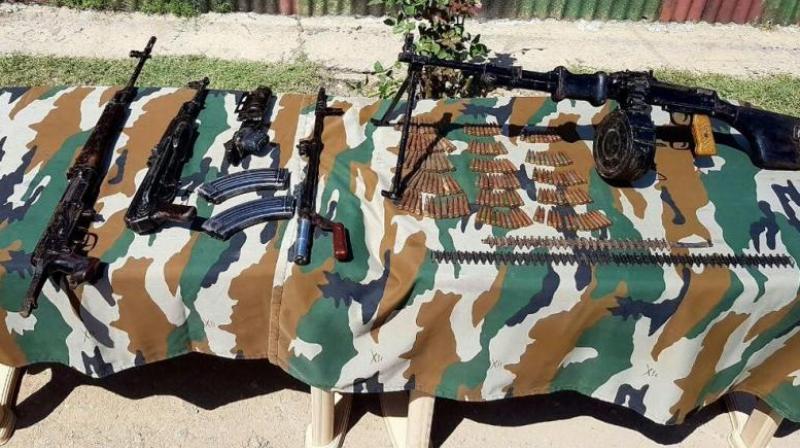Jawans mutilation: Pak army carried daggers, cameras to record attack

Jammu: The Pakistani Border Action Team (BAT) made up of special forces men and terrorists were armed with 'special daggers' and 'headband cameras' to mutilate and record the attack on the Indian Army patrol party after entering 600 meters across the LoC in Jammu and Kashmir's Poonch district.
The attack left two Indian soldiers dead while one BAT member was killed in retaliatory action by Indian troops.
Army troops during search and sanitation operations, recovered the body of a member of the BAT team along LoC in Gulpur sector of Poonch district on Thursday.
"The body of the intruder killed in the BAT attempt on 22 June has been retrieved and handed over to the local police," a senior army officer said.
"Arms, ammunition and other war-like stores including a special dagger and a headband with a camera, knife, one AK rifle, 3 magazines, 2 grenades besides dresses and bags was recovered which reflects the barbaric mindset of the Pakistan Army," he said.
"The resolute action of our soldiers didn't let the nefarious plan (of mutilating bodies and recording it on camera) succeed," officer said.
Giving details, the officer said that a special class of dagger and a knife was meant to engineer quick mutilation and beheading of jawans killed in the firing exchanges and it has been foiled by the quick action by Indian soldiers.
The BAT member was wearing headband with camera on his head to record the action and possible mutilation of jawans, which was prevented by other troops who shot dead one of them and injured another, he said.
The officer said it is matter of investigation whether the camera was live connected with Pakistan Army establishments across the border.
"The data and details of the camera will be analysed," he said.
"We are confident that another BAT member has also been killed but his body was taken back by the other members of the BAT," he said.
In the third such attack this year, a team of Pakistani special forces on Thursday sneaked 600 metres across the Line of Control (LoC) into the Poonch sector of Jammu and Kashmir.
The Border Action Team (BAT), which generally comprises special forces personnel of the Pakistan Army and some terrorists, carried out the attack at around 2 pm on Thursday under heavy cover fire by Pakistani troops from their posts, he said.
"A Border Action Team of five to seven heavily-armed men, under the cover of Pakistani firing, entered 600 meters inside the LoC in Gulpur forward area in Poonch sector around 2 PM yesterday and launched a fierce attack on Indian Army patrol party with several types of weapons," the official said.
The Pakistani attackers came up to 200 meters near the Indian posts.
During the attack, the Pakistani troops resorted to firing in Gulpur-Karmara-Chakan-Da-Bagh area along the LoC.
The armed intruders targeted an area domination patrol of the Indian Army, triggering a gunfight, the official said.
The Indian troops killed one of the attackers and injured another whose extrication was facilitated by the cover fire by the Pakistani troops from their posts.
In the firefight, two Indian soldiers were killed. They were 34-year-old Naik Jadhav Sandip of Aurangabad, Maharashtra and 24-year-old Sepoy Mane Savan Balku of Kolhapur, Maharashtra.
The Pakistani firing continued till 3.30 pm on Thursday even as the Indian posts retaliated strongly.
In a similar BAT attack on May 1, two Indian soldiers were beheaded in Krishna Ghati sector in Poonch district. That attack too was carried out under the cover of shelling by the Pakistani troops.
Prior to that, a BAT attack was carried out in February but there were no casualties.
Earlier, there have been several BAT attacks in which Indian jawans have been beheaded or their bodies mutilated.
On October 28 last year, militants attacked a post and killed an Indian Army soldier and mutilated his body close to the Line of Control (LoC) in the Machil sector.
In January 2013, Lance Naik Hemraj was killed and his body mutilated by a BAT. It had also beheaded Lance Naik Sudhakar Singh.

